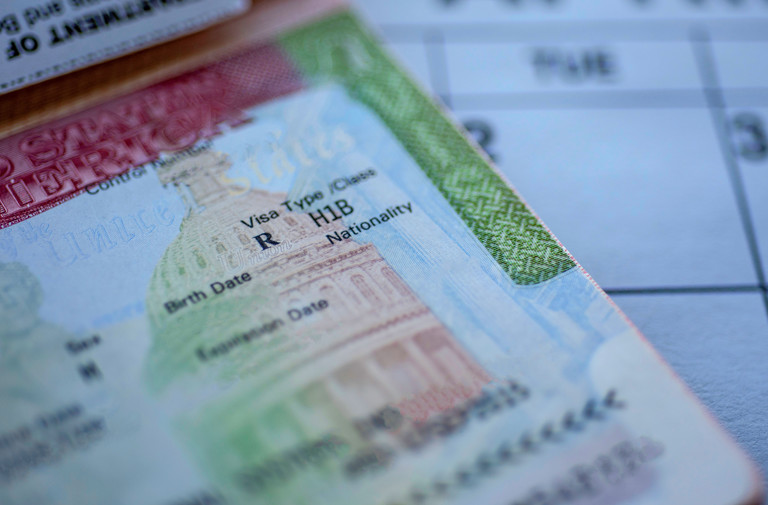In a bold move shaking up the immigration landscape, the Trump administration’s new H-1B visa rules are set to slap a hefty $100,000 fee on petitions for foreign talent. This could drive up costs for hiring international lawyers but clear the path for top-tier experts to land spots in America’s competitive legal market.
The proposed H-1B changes 2025 are igniting fierce debates across Washington and Wall Street, with immigration experts warning of ripple effects on Big Law firms and the broader U.S. economy. At the heart of these H-1B visa reforms is a push to prioritize “the best and the brightest,” as outlined in President Trump’s September 19 proclamation. The $100,000 fee applies to new petitions for workers abroad, effective September 21, while a shift to a weighted lottery system favors those with higher salaries and advanced degrees. For U.S. employers eyeing foreign lawyers in high-demand areas like tech law and international arbitration, this spells both barriers and breakthroughs.
These H-1B visa reforms aim to curb what critics call abuses in the program, where companies flood the lottery with entries to game the system. Federal data shows that in fiscal year 2025, over 300,000 registrations vied for just 85,000 slots, with tech giants like Amazon and Google scooping up the lion’s share—Amazon alone netting more than 10,000 approvals by mid-year. But now, the fee could slash entries by 30-50%, according to preliminary estimates from the U.S. Citizenship and Immigration Services (USCIS). Exceptions exist for pre-September petitions and current visa holders, ensuring no immediate disruptions for those already stateside.
Background on the H-1B program reveals its evolution from a 1990s tool for filling skill gaps to a flashpoint in today’s talent wars. Originally capped at 65,000 visas annually—plus 20,000 for advanced degree holders—it’s become essential for sectors facing domestic shortages. In law, foreign attorneys bring niche expertise in cross-border deals and compliance, often from India and China, which accounted for over 80% of approvals last year. The new rules, including raised prevailing wage floors via upcoming Department of Labor rulemaking, force employers to justify hires with premium pay—potentially starting at $150,000 for junior roles.
Immigration attorney Maria Gonzalez of Fragomen Del Rey Bernsen & Loewy LLP calls it a “double-edged sword.” “The fee will deter mid-tier firms from sponsoring anyone new, hiking effective costs by 20-30% when you factor in legal prep,” she said in a recent interview. “Yet for elite candidates—think Harvard JD holders with five years in mergers—the weighted system boosts their odds from 25% to nearly 60%. It’s making foreign lawyers more accessible for those who can afford the gamble.” Recruiters echo this: One headhunter at Major, Lindsey & Africa noted a 15% uptick in inquiries from international associates since the announcement, as firms pivot to poach ready talent.
Public reactions split along predictable lines. Tech advocates and the U.S. Chamber of Commerce decry the changes as a “talent tax” that could cost the economy $50 billion in lost productivity over five years, per a Brookings Institution analysis. Labor groups, however, applaud the curb on wage suppression—citing cases where H-1B lawyers earned 20% less than peers, undercutting American grads. On Capitol Hill, Senators Chuck Grassley (R-IA) and Dick Durbin (D-IL) are fast-tracking the H-1B and L-1 Visa Reform Act, adding audits and penalties to weed out bad actors. Social media buzzes with #H1BReform trending, mixing stories of displaced U.S. workers with pleas from foreign grads stuck in limbo.
For everyday Americans, the impact hits close to home in unexpected ways. Higher fees might stabilize legal fees in corporate America by retaining domestic talent, easing the squeeze on young lawyers entering the field amid a 10% unemployment spike in legal services post-pandemic. But it could inflate costs for consumers too—think pricier mergers rippling into higher gadget prices or slower innovation in AI ethics law, where foreign expertise shines. Politically, it’s fuel for the “America First” fire, with polls showing 62% of voters in battleground states backing tighter visas, per a Pew Research survey from late September. Tech hubs like Silicon Valley feel the pinch hardest, as startups warn of stalled growth without affordable global hires.
Economically, these H-1B visa reforms could reshape hiring pipelines. Big Law powerhouses like Kirkland & Ellis, which sponsored 200+ foreign attorneys last year, face tough choices: absorb the fee or scout domestically. Smaller boutiques might bow out entirely, consolidating power among the top 100 firms and widening the urban-rural divide in legal access. On the flip side, the weighted lottery democratizes entry for superstars, potentially diversifying boardrooms with fresh perspectives on global trade pacts.
User intent here is clear: Employers and aspiring lawyers seek actionable intel on navigating the H-1B lottery odds and fee waivers, while policymakers hunt data on enforcement. Firms should audit current pipelines now—USCIS advises early filings to beat backlogs—and consider alternatives like L-1 transfers for intra-company moves. For foreign talent, upskilling via certifications could tip the scales in the new merit-based draw.
As these H-1B changes 2025 unfold, the U.S. legal sector braces for a leaner, meaner talent pool. With lawsuits already challenging the fee’s legality—filed October 3 in federal court—the road ahead promises more twists. Stakeholders from coast to coast watch closely, knowing this could redefine who wears the suit in America’s courtrooms.
By Sam Michael
Follow us for the latest updates and subscribe to our newsletter for push notifications on breaking immigration news—stay ahead in a changing world!
